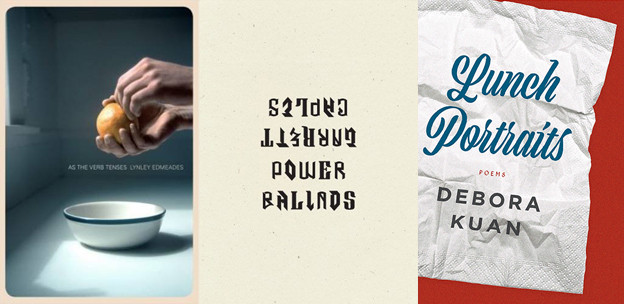
Ballads, portraits, and tenses
Amy Stidham

J2 editorial assistant Amy Stidham weighs in on three new poetry releases.
As the Verb Tenses, Lynley Edmeades (Otago University Press, 2016)
As the title suggests, these poems are a contemplative pause, a breath in which Edmeades, at times anxiously, tries to sort out the past and construct a future. Edmeades’s speaker has “forgotten the three, four, five” of childhood, yet, in the search for order and meaning, remembers details with a specificity that is nearly tangible: “The side / without the hedge / that makes my sister sneeze / and with the plastic pool, / and the orchard / with plums in autumn / and lambs in spring.” At the same time, the future looms, and these poems grapple with what it is like to be “moving into the infinite, regardless of … being singular.” The speaker tells her niece and nephew, “During is the way things happen inside time.” These poems are during.
Power Ballads, Garrett Caples (Wave Books, 2016)
Power Ballads presents a surprisingly fresh approach to masculinity. Caples introduces his reader to a fat Marlon Brando, transforms temporarily into James Bond, simply because he’s feeling “Italian and musical,” and writes a poetic biography for Richard O. Moore in the style of Bob Dylan. Caples’s wordplay is intricate and playful. His words flirt with one another, combinations of sounds at times nearly indiscernible from one another: “the flautists and flauntists,” “the hardened badgers, bargers, and barterers.” These poems explore what it means to be a man with a self-awareness of the ridiculousness of “manliness” as a whole that is both thoughtful and fun to read.
Lunch Portraits, Debora Kuan (Brooklyn Arts Press, 2016)
There really is no way around the fact that Lunch Portraits is hilarious, with spectacular lines like “I want to drown in six pounds of macaroni salad.” However, past the comedy of Kuan’s images you find an investigation of the world in which these objects exist. These poems are full of American pop culture icons such as Mickey Mouse and the Super Bowl, but not in order to disparage them. Kuan embraces the details of mass culture and of everyday life, good and bad. In “Portrait of a Lounge Singer,” the lover is “scrawny” and “his ass / is small,” but “[you] stroke that ass. Of course you do.” Of course you do.